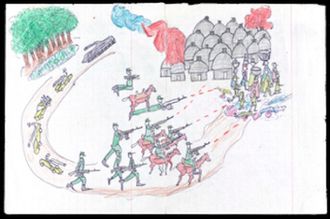Survivors of Sudan's war to speak at London event

Journalists and survivors of the year-long war in Sudan will describe their experiences at a meeting in London on Tuesday, April 9th. A book of drawings by children caught up in twenty years of conflict in Sudan will also be launched at the event at the Frontline Club in Paddington. The meeting will also be live streamed on Zoom.
The UN warns that the fighting has caused the world's biggest refugee crisis, with eight million civilians fleeing their homes. Local NGOs believe an equal number of civilians have been killed in the past year as have died in Gaza, but with little media attention.
A Year of War
On April 15th 2023, fighting broke out between the Sudanese Armed Forces and its militia partners, the Rapid Support Forces. Only eighteen months before, they had together overthrown a fledgling government of technocrats who were trying to transition Sudan from three decades of Islamist dictatorship to democracy. Now, these former colleagues are fighting each other to control Sudan and its natural resources. In the process, they have destroyed the capital Khartoum, killed an unknown number of civilians, and caused the world's largest famine. All mediation has failed, while Iran, the UAE, Russia, and Egypt sustain the fighting with weapons.
Today's misery is rooted in three decades of Islamist rule which deprived the areas beyond Khartoum of development, justice, and freedom. Sudan's self-enriching military rulers aimed to create an exclusively Arab and Islamic Sudan, irrespective of the country's ethnic and religious diversity. This led to the deaths of two million mainly non-Arab and non-Muslim Sudanese, many of them Christian, in the southern part of the country which eventually spilt off to become South Sudan. At least 300,000 Black African Muslim Sudanese in the remote western Darfur region subsequently died, in addition to an unknown number of Black African Christians in the Nuba Mountains and Blue Nile.
Now, non-Arab Sudanese are again being targeted, particularly in Darfur where local NGOs believe at least 30,000 have been killed by the Rapid Support Forces (RSF), and more than 100 villages have been burned. The RSF uses its control of Sudan's gold mining to buy weapons from the UAE (which denies it supplies arms via neighboring Chad) and Russia, which wants a military base on the Red Sea. The Sudanese Armed Forces are sustained by long-time friends Iran and Egypt both of which fear a Muslim-led democracy might emerge from the recent transitional government.
While majority Arab and Muslim countries have condemned Israel's treatment of the Palestinians for decades, none have voiced concern for the elimination and persecution of Sudanese Muslims in Darfur over the past twenty years. "We are the wrong kind of Muslims: we are Black," according to local human rights activists. Nor are regional players supporting efforts to deliver aid: the UN's emergency effort is only 4% funded. Moreover, Ukraine and Gaza dominate the headlines despite the geopolitical implications of Russia and Iran gaining a foothold on the Red Sea.
Since the fighting began, eight million Sudanese have fled their homes, many to Egypt, Chad and South Sudan, joining the three million already displaced due to the regime's years of ethnic cleansing. The EU is paying Egypt $8 billion to prevent migrants reaching the Mediterranean.
It is notable that Sudanese civilians have not rallied to either side in the current conflict. Instead, civilians have formed neighborhood support groups distributing whatever food and medicine they can find. People have set up operating theatres in their front rooms, manned by trainee professionals and those medics who have not fled. Despite such challenging conditions, and decades of tyranny, most Sudanese continue to want a pluralist, secular, democratic government. It seems further away than ever at the moment.
The April 9th event begins at 6.30 at the Frontline Club, 13 Norfolk Place, Paddington, London W2 1JQ. To book tickets see: www.eventbrite.co.uk/e/war-seen-through-childrens-eyes-tickets-866375371057?aff=oddtdtcreator
To watch the meeting on Zoom: https://us02web.zoom.us/webinar/register/WN_5Y4amrjtQr-pfID5m7Gr_Q
For more information about the book of Sudanese children's drawings go to: www.WagingPeace.info


















